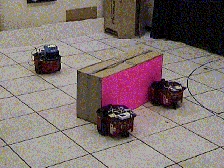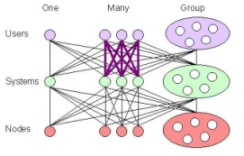Research Interests
My research interests lie mainly in two areas:
- high-level multi-robot coordination
- low-level robot control interfaces
I pursue these research interests in the USC Robotics Lab, part of the Center for Robotics and Embedded Systems (CRES).
I am currently involved in 5 research projects:

|
Multi-Robot Task AllocationImportant theoretical aspects of mechanisms for multi-robot task allocation have, to date, been largely ignored. In this project, we are trying to address part of this negligence by formally studying the problem within an organizational framework developed in the Operations Research community. In particular, we are currently exploring multi-robot task allocation as an instance of the well-known Optimal Assignment Problem. In this light, we have recently analyzed and compared the algorithmic characteristics of several existing approaches to the problem. |

|
Auction-based Multi-Robot CoordinationThe key to utilizing the potential of multi-robot systems is coordination. In this project, we are exploring economically-inspired approaches to achieving robust multi-robot coordination. In particular, we have developed MURDOCH, an highly-scalable, distributed, auction-based multi-robot coordination system. A variant of the well-known Contract Net Protocol, MURDOCH has been experimentally validated in a variety of task domains with physical robots. |

|
Player / StageThe Player/Stage project develops and distributes open-source robot control and simulation software. The primary products of this project are Player, a device server that provides a powerful, flexible, language- and platform-neutral interface to a variety of sensors and actuators (e.g., robots); and Stage, a highly parameterizable sensor-based multiple robot simulator. Player & Stage are widely used in labs and classrooms around the world. I am a founding developer on the project and I head development of Player. |

|
Mathematical Modeling of Multi-Agent Systems(Led by Kristina Lerman)Our research goals are two-fold:
|

|
Hi-Scale User-System Interaction (HiSUSI)(Led by Ashley Tews)This project is concerned with investigating the high-level interaction dynamics between people and multiple robotic and embedded systems. The key question is how to connect possibly hundreds of users to hundreds of systems and maintain personal interaction. An interaction infrastructure has been developed for this purpose that allows interaction at both extremes. This project is part of the larger Human-System Interaction project at USC Robotics. |
